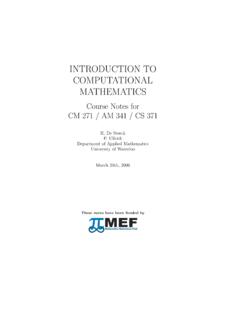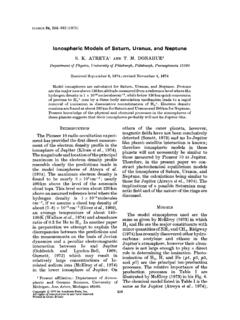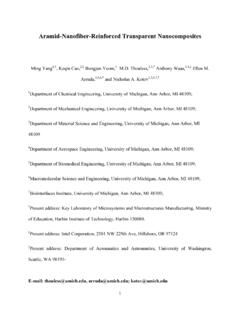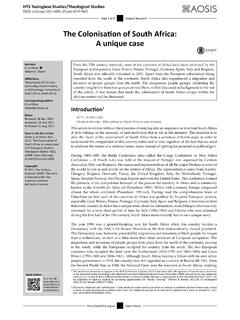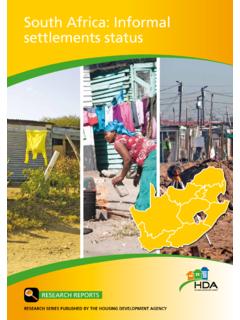Transcription of COST AND FEE ALLOCATION IN CIVIL PROCEDURE2 south …
1 COST AND FEE ALLOCATION IN CIVIL PROCEDURE REPUBLIC OF south africa Introduction south African law is an uncodified CIVIL law system with Roman-Dutch law, and originally Roman law, as its major formative element. Since the beginning of the nineteenth century a strong thread of English law has been woven into the fabric of that As such, it is one of the so-called mixed jurisdictions at the intersection of CIVIL law and common In particular, procedural techniques have largely assimilated the English patterns.
2 The legal profession is organised on the English model with a distinction being made between attorneys (solicitors) and advocates (barristers). Like his English counterpart, the south African advocate gets his brief from an attorney (solicitor) and not directly from the client. The modern south African law of costs, which in broad terms follows the English pattern, is to be found in a multitude of decided cases and a large number of statutory 1 See HJ Erasmus the Interaction of Substantive and Procedural Law: the Southern African Experience in Historical and Comparative Perspective (1990) 1 Stellenbosch LR 348; HJ Erasmus The interaction of Substantive Law and Procedure in Southern Cross.
3 CIVIL Law and Common law in south africa ed Reinhard Zimmermann and Daniel Visser (Clarendon Press, Oxford 1996) 140. 2 See, in general, Southern Cross. CIVIL Law and Common Law in south africa ed Reinhard Zimmermann and Daniel Visser (Clarendon Press, Oxford 1996); Mixed Legal Systems in Comparative Perspective ed Reinhard Zimmermann, Daniel Visser and Kenneth Reid (Juta & Co Ltd, Cape Town 2004) 3 The principal general work is that of AC Cilliers Law of Costs 3rd ed (LexisNexis, Durban 2008). Other major texts are the Chapter on Costs in Herbstein and Van Winsen The CIVIL Practice of the High Courts and the Supreme Court of Appeal of south africa 5th ed by Cilliers, Loots and Nel (Juta & Co Ltd, Cape Town 2009) and Jones and Buckle.
4 The CIVIL Practice of the Magistrates Courts in south africa 9th ed by Erasmus and Van Loggerenberg (Juta & Co Ltd, Cape Town 1996, 1997) vol II, 33-23 et seqq. 2[1] The Basic Rules The basic rules were stated as follows by the Constitutional Court in Ferreira v Levin NO and Others4: The Supreme Court has, over the years, developed a flexible approach to costs which proceeds from two basic principles, the first being that the award of costs, unless expressly otherwise enacted, is in the discretion of the presiding judicial officer, and the second that the successful party should, as a general rule, have his or her costs.
5 Even this second principle is subject to the first. The second principle is subject to a large number of exceptions where the successful party is deprived of his or her costs. Without attempting either comprehensiveness or complete analytical accuracy, depriving successful parties of their costs can depend on circumstances such as, for example, the conduct of parties, the conduct of their legal representatives, whether a party achieves technical success only, the nature of litigants and the nature of proceedings.
6 The purpose of an award of costs to a successful litigant is .. to indemnify him for the expense to which he was been put through having been unjustly compelled to initiate or defend litigation, as the case may be. Owing to the operation of taxation, however, such an award is seldom a complete indemnity; but that does not affect the principle on which it is A costs order is not intended to be compensation for a risk to which a litigant has been exposed, but a refund of expenses actually incurred.
7 4 1996 (2) SA 621 (CC) at 624B C (par [3]). 5 Texas Co (SA) Ltd v Cape Town Municipality 1926 AD 467 at 488. 3A distinction is made between party-and-party costs and attorney and client costs. Party and party costs are those costs that have been incurred by a party to legal proceedings and that the other party may be ordered to pay. They do not include all the costs that a party to a suit may have occurred, but only those costs, charges and expenses that appear to the taxing master to have been necessary or proper for the attainment of justice or for defending the rights of any party.
8 Those costs, charges and expenses will include only those costs incurred in the litigation itself. So, for instance, costs of obtaining counsel s opinion as to a party s prospects of success in a contemplated action will not be allowed as between party and party. The taxing master of the court in which the litigation took place decides which costs, charges and expenses incurred by a litigant who has been awarded costs against his adversary, should be allowed as having been necessarily or properly A litigant who has an award of costs in his or her favour, submits a bill of costs to the taxing master for taxation.
9 A bill of costs is drawn in accordance with the tariffs of fees set in the Rules of the court concerned, and in accordance with established practice where no fee is prescribed for a particular service. Attorney-and-client costs are the costs that an attorney is entitled to recover from a client for the disbursements made on behalf of the client, and for professional services rendered. These costs are payable by the client whatever the outcome of the matter for which the attorneys services were engaged and are not dependent upon any award of costs by the court.
10 In the wide sense, it includes all the costs that the attorney is 6 The principal text is that by MS Jacobs and NEJ Ehlers Law of Attorneys Costs and Taxation Thereof (Juta & Co Ltd, Cape Town 1979). 4entitled to recover against the client on taxation of the bill of costs. The term is also used in a narrower sense as applying to those charges and expenses as between attorney and client that ordinarily the client cannot recover from the other party.




